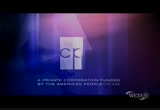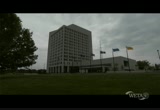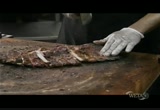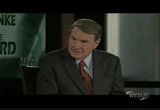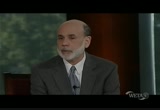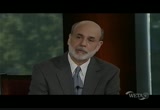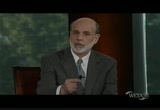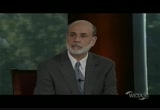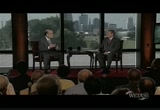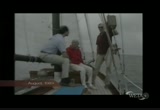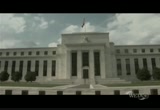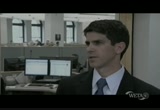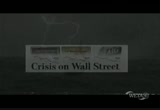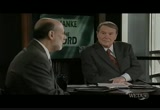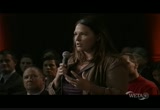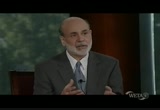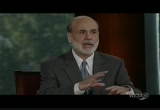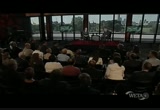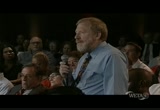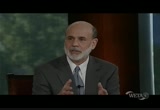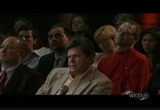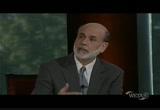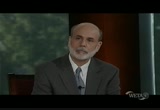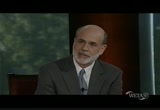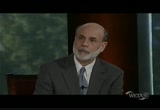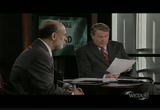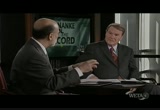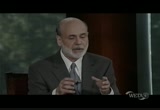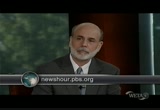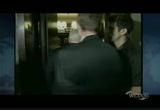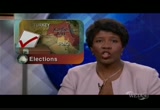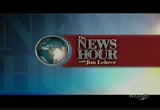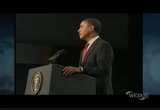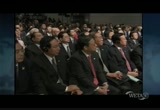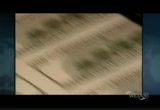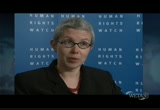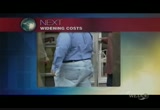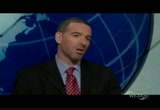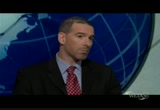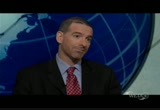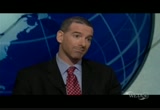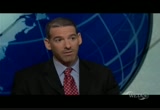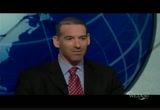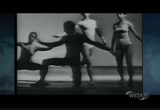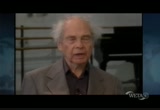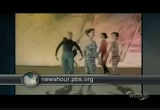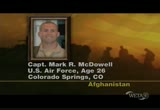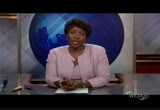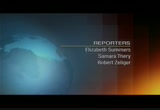tv The News Hour With Jim Lehrer PBS July 27, 2009 7:00pm-8:00pm EDT
7:00 pm
captioningponsored by cneil/lehrer productions >> ifill: good ening. i'mwen ifill. on the newshouthis monday: the lead sry-- federal reserve chairman bernanke on the rord, on the economy, part e; then thother news of the day-- president obama's cl for deeper tiesith china, as 150 inese officials come to washington; new research on he gh cost of obesity; and the life and legacy of danr and
7:01 pm
choreogpher merce cunningham. major fundinfor the newshour with jim lehrer is providedy: ♪ ( ha rock guitar riff playing ) >> we are intel, sponsors of tomorrow. what the world needs now is energy. the energto get the economy humming again. the energy to tackle chalnges like climatchange. what is that energyame from an energy company? eryday, chevron vests $62 million in people, in ias-- seeking, teacng, building.
7:02 pm
fueng growth around the world tmove us all ahead. this is the power ohuman energy. chevron. and with the ongoinsupport of these stitutions and fodations. and... thisrogram was made possible by the corporation f pubc broadcasting. an by contributions to your p station fromiewers like you. thnk you. >> ifl: our lead story tonight is the statof the economy and what the federal reserve banis trying to do about it. it takethe form of an unprecedented cversation, featuring thchairman of the federal reserve bank, b bernankeand citizens from and around kansas city, ssouri. our invitation, they joined moderator jim lehrer lt night for a speci newshour forum.
7:03 pm
's another in our spotlight cities sies designed to highlight issues that aron the minds of people around the country. we'll bshowing you the entire rum over the next three nights. we start tonight with newour economics corrpondent paul solman, who gives us so backound on the economic situation inansas city, beginning aits federal reserve ban where our discussion was recorded. >> one of 1ecognize nal federal reserve banks, congress's efforto spread the wealth anddecentralize he fed, the kansas city branches amon other things a bank to calanks. millions of dollar in deposits andithdrawals floin and out of a three story automated caault every day as t region's checks are cleared. the fed sits i the heart of kansas city, itselfn the het of america. ck in the 1920s and30s the city became fams as
7:04 pm
bo pandergass's tn. s political machine helped launch hry truman, his wide en ways, thekansas ty jazz scene. and legends like b b pionr charlie byrd parker. today somealf a million folks liveere, within 250 miles of both the geographic and population centers of the country. location hs made kansas city a ngime tradinghub for farmbeltproduce in unfinished and famoly edible form. s industries like bioch and telecom are now factors too. asefits a city ofhe plains, peaps, khas been a bit less shaken by the financial cris than othe places. it's joblessrate slightly below the tional average. ut there are plenty of people he looking for work 3,000 jobs wereost in the last year, even at such pillars of the corporate mmunities as hallmark. me of ose cards might
7:05 pm
speak to the 200 laid off there. at sprint neell, 2,000 jobs lost. as eewhere, a sagging tax tank has opened a dget gap. city hall has slaed its workforce by 10% meaning public service cutbacks. no has the area been immune from what you might call auto disease. while the gplant in nearby fairfax is still cranking, more tn a dozen car dealershi are slated r decommission. and theost famous road h of them l, harley davion has had to dich 500 area jobs. plus there's amortgage crisis which prompted a protest at the nsas city fed last fall. urging help for hard- homeowners. in short, when it comes to the gat recession, unftunately, everything's pretty much upto date in the tenth district the deral reserve. >> ifill: with thatn mind we aked a nonpartisan organization >> ifill: with that mind, we asked non-partisan
7:06 pm
organization,ansas city consensus, to helus identify area residents witquestions for chrman bernanke. th were pre-interviewed by newshour staff, anselected by us. our staff alsoelped jim select questions submied by our line audience. he now is part one of our forum, "bernke on the record" with jim lehrer, athe federal reserve bank in kansas cy. >> lehrer: mr. cirman, welcomesir. >> thank you. lehrer: underlying many of the questions tha these folks have ar questions that are basic about the ederal reservet -- tself. for instan, i would like for gwenbailey to stand up. tell the chairman what u told ourroducer when she taked to you about your questions for the chairman. >> my ne is gwen bailey i'm a soci worker with visiting nurse associatn. and my particular interest is exactly wha is the federaleserve. i don't have a cl what they do, how they imct our
7:07 pm
lives. and tt is why i was very interested tobeelected to articipate in this forum. >> gwen, you hve agood place to start tre. the federal rerve is an independent govnment agey, also called the central bank. it wasounded about a hundred years ago. it was founded actually in the begiing to try to address financial crises. there had been a panic in 1907. and that starte the pocess by which woodrow wils created the federaleserve. throughout our 100 yar history we have bn very much involved in dling with financi crises, trying to address situations just like we have now when the financial markets re in disarra and they are affecting the economy. the fed has some other important functions well. we set short-term ierest rates in order tory to kee the economy onrack. we have a mandate from t congress to move intest rat up and down as needed to tryto promote employmt and to keep prices stable, keep inflation lo so monetaw= policy, move interesting tes around is ry important.
7:08 pm
we ha lots of other things we do asell. we rk with other supervisors tory to make sure e banking system is stble. and we've had a lot of work to do on tt in the la coupleof years. and ma people don't know, we aso do consumer proteion. so if you ok at your credit cd bill,illou see the periodic statement, the struure, the lin and the way th's organized was determed by the federal reserve. and t federal resve sets a lot of the rules asociated with how credit car can be charged, kinds of penalties, fees, and so on. so badly speaking, financial stality, trying tokeep the financial markets stable, motary policy, interest rtes to move e economy into a higher pace o a lowerace. banking supervion and conser protection. d so a whole range of financial economic issues. >> lehrer: thank you, ms. bailey. jusa follow up, mr. chairman. hen you say independent agency, defend -- define "indendent" >> we are an agencof the government but we ae thin the government,we need to
7:09 pm
have some idependence from congress and t adminisation. and the most important area is monetary polic theres a lot of evence that wh poticians make monetary policy you don't get od results. liticians have a sht term horizon or they may wat the central bank to print money to payor the government deficit. either one those this is goi to create a lot of inflation. what wve learned overtime, and this is a lo of evdence to support thi is that when t central bank is allowed to ma monary policy, with the ierest, the long-term interest of th economy in mind, without the interferen of the administration orthe congress, you ge much better reults. you get low inflation and you get good growth this has been seeall around the worl we vey, ry ssitive tohis issue. want to be very sure that when we make monetary policy that we're doing it in a npartisan way. th we're doing it based on what is good for the economy and that wee to the bei told at to do byhe president or t congre. >> so when you get up in the orning, who do you --
7:10 pm
without do you go to work for? who do you feel you're answerable to? >> i'm answerable to the american people. i was aponted by th president through a 1year te as a governor but a four-year termas a chairm of the fe and waspproved, i was nfirmed by the nate. so i obvusly go through a politil process to be appnted. but again, e federal reserve gernors, the board of governor theeven people whoare at the head of the fed in washington are gerally professionals, technical peop, people who are not life-time politicians. people who waed to serve the cntry, using their knowlee in one of these areas that i was talking about like bking or monetary picy. >> leer: when somebody says oh, the fed is essentlly the fourth branch of government, h do you react to tt? >> at's a tremendo exaggeration. as i said,he fed needs independence in making monetary poli. and that's good for evybody. because helps keep inflation lo but were very accountable.
7:11 pm
we ve to report regular and frequently to the coress. i was ju this last wee, had ttestify, maybe y aw me on televisio i had to testify before bh the use and e senate explaing our policies, wht we are doing. d reporting to the congrss and the american people about our -- our ias, our decisions and how ey affect t economy. and agn weare subject to at point. pcess. and congss can chge the ules as well. so it is not a constitutional ty situatio it's one where our indendence has to be won every day, you will, in that we ve to sw that we are producingood results and doing so without interventi or interfence from other political bodi. >> lehrer: okay. got it. now to set the vaous stag for where we go from here weave a report by newsho economics correspondent paul solmon. >> in missouri, with more federal reserve branes
7:12 pm
than any state in t country, kansas city,with mor fountains than any city outside rom where better, we thouht to launch an explanation the fed's actions to supply liquidity sohe economy can rema afloat. economist ckerna. >> just like tat old taphor about the federal reserve trying -- trying to steer a course betwee flation and recession. >> i' sure you did a segnt 20 years ago with a couple o my great old rofessors from m.i.. >> inde, we did. 20 yars ago we we to speak with nobel laureates who gave t image of fed chairman as both capins a classical ist. >> he reminded m of a famous paage in the odyey that describes ulysses trying to negotie a passa between two rocks. >> in her's epic poem t odyssey, one rock -- for the economics professors, it
7:13 pm
symbolid the danger of inflation which makesoney worth less. between the other rock, cabdus, a shi sucking whirlpool. the economists, symboliof the downrd spire of recession a unemployment. >a little bit of recession creates a little pressure for more recession. my business is bad, i buy fewer mateals. i layo workers. they cn't spend incomes they don't have. c thus, the fed's jo to steer a seady sturdy middleourse. no wonder the fed is bui to seem so washington-rssuring. >> this is the boardroom where the boar of gernors meet. >> reporter: don cohen is current vice cirman of the fed. >> this is also the room whe the fedel open maet commtee meets to discuss monetary policy. >> reporter: and toake monetary polic which is how the f steers. by deciding to drawoney out of the economy if inflations threaten, pump money in if, as now,
7:14 pm
recession is the mster. >> when the deral open market commite makes polcy decisions, it's the job of th desk at the market to actually go t d implement that. >> reporter: the desk is at the new yorked famous for the five metric tons of gold, more th fort knox, tucked unrground. diehard with a vengence had toe-create the vault. 14 floors above the gold, brian sak runs the open market dk. >> in open market operations the way we crea money is by buying securies. >>reporter: amaziny, the fed's usual job r almost a cenry is as simple as that. toadd money to the economy, the fed buys u.s. government securities. on this dte, $3 bilon worth, and thereby crees new money. federal reserve. it supplying in fed spe, quidity. >> financial firmwill be giving us treasury securities, in return they'll be getting rerves or just liqui assets that they could use for a variety
7:15 pm
of purposes. but th're not really anything. i mean ty're just ectronic entries somewhere, on their books. right, right. we don't send a truck out with $3 billi in bills. >>eporter: but to nancial firms the reserves are likcash in the vault. the more reserv banks have, the more lns they can mak and in competingo make them, the lower the interest rates they offer. the usl result,ore money flows through the economy. reurning to the water metaphor, however, these were not usual times. that's because what everyone's been calli a perfecttorm hit. the economy appear to going under. the fed responded wh what seemed like a radical laundry list. it pumped mon into e system ort term, lowering overnight interest rates dramatically. loaned money long term tfinancial firms in peril, nally with treasury, i gave money to fragile rms directly. back in the watery city of
7:16 pm
fountains, econost nick persona. >> wh they did was to provide financl liquidity. they ught commercial paper, mortgaged backed serities. they bought preferred stocks, they de directloans. they incted hundred of billns of dollars of funds, of liquidity in the financial system. >> reporter: so 20 yes after we first shot them explaining theed on martha vineyard lar summers, we asked bob solo to his steeringhe course met a for -- metaphor. >> we are using this at because weeot goingut on the water in this wd. steering courseetween inflation and ression, the fed ives interest rates dowalmost to 0 and yet we're sll headed intohe whirlpool of recsion. what happened? >> wellthink of it this way. in normal winds, the fed can steer bween flation and recession making small adjustments. but then a year or 18 months ago, there weren't nrmal wind it was a perfect storm, a rely dngerous blow.
7:17 pm
and a boat likehis c't ma headway. it wilget knocked down. so the fed had to try something dramaticly fferent, way outside its normal procedures and it d. >> lehrer: mr. chairman, first do you agreeith the perfe storm analogy? >> a lot ofhings happened. a lot of tings came together. it created i think, probly the worst financial crisis ceainly since the gre depression and possibly even includin the great depreion. so yes, i agree. >> lehrer: at were your worst momen for you personall >> , the worst moments were bk in september. the financial crisis began with fannie maand freddie mac the large housing companieshat wereaken over by the government. and subsequent to that, numer of verylarge financial firms ca under enormous essure. a one of them, lehman brothers,an investment bank, faile others came close to failure, need government support. not just the united states but around t world. and those wereome very
7:18 pm
long nights i spent on te sofin my office as we worked to tryo keep the financial system runng. >> lrer: yea. let's go to a qestion here from janelhui about this very thing, th storm and wh chairmanbernanke and others at th fed were doing. >> hi i'm a kansas city mother. i guess ha a couple of short questions. first of all, we've given millions, hundreds of millions ofollars of ta money to these large corporations, is that going to be enough to correct the situation. and secondly, you know, i'll use the analy of nature. when a prairie fi burns through t takesut all the big overgrowth a allo all the smalstuff to pop up. why don'te just let the behemot lay down and make oom for the small
7:19 pm
businesses, thk you. >> that's areatquestion. the problem we have is that in a financial crisis,if youlet the b firms collapse in a disorderly way, they'll bring down t whole system. when hman brothers faid, the financial markets went into anaphylactic shock, sically. it washat shock to the financial system at lead the global recessionhat began last fll, this was probably the worst one since world war ii, so it wasn to help the big rms that we intervened it was to table lyze theinancial sysm and protecthe entire global economy. nowou might ask, you know, what's the dl? y are we doing that? it's a terrible proble it's aroblem called th too big to fa problem. these companies hav turned out to b too big to allow to clapse. becase again, if they collapse the, when the ephant falls down, allhe gra getscrushed as well. we really need, and this is critically importt, we really need a new regulator frameworkhat will make
7:20 pm
sure that we not have th problem in the futu. and the president, e admistration proposed a system that would include, an let me just mentio two items, first that the federal reserve would oversee allthese major big firms that are quotetoo big to fail. and would putxtra tough requirents on their capital and their actities, what they can do,he risks they can take. that would be t first art. but the secnd part is very important. we would modify the nkruptcy code. the problem nows that the bankruptcy code such that when one ofhese firmfails it's a disorderly me. what we need is a system where the government canay this firm is about to fail. we can'tet it just fail but we got -- we al don't want to prop telhone up either. need an alternative betweenbailout and bankrupty. and that alternate is a system where the governments can come in and sei th firm. d then unwind it an ornarily way, sell offthe assetsnd do that in a way thadoes not cause chaos in thfinancial markets. e have a system like that
7:21 pm
already. right nheederal depos insurance corporation, whenev a small bank or a medium sized bank isbout to fail,t canome in before it fails, grait, sell off assets, pay off the desitors and this all happens without caung a hugeroblem in the financia markets. that's what we need. and a agree with everyone here. too big failis a terrible situaon. wee got to fix that. and i thnk that's the top priorityor policy going forward. >> lehrer: bill bla had, staying on th storm question, has a sho questn on this, bll black? >> bill black, professor of economics law and criminalology and former financia regulator umkc. if this a terrible situation and creates tis kind of moral hazd, all thry says we need to remove the officers w put us in this situaon. when ll the fed begino removehose officers? >> well, when we've gotten into situatiohere
7:22 pm
ompanies were actually failing and had to be supported,irst i shoul say that this was not a fed operations. th fed and the treasury work cloly together so it's bn a broade, and the fdic has participated as well. in those caseshere mpanies were prevent from failing,he shareholders typically lost virtuay all their money and we did replace the officers. take for examp, aig. aig's ceo was fid. the shaeholders lost all their money. br stearns, bear stearns sharolders's lost all their money and the comny was ten over by forecompany. so you know, in most cases, we ha replaced t leadership and we haveade sure the shareholders have lost the greest part of theiralue. >> got an e-ml, mr. chairman. this is from carl denninger florida. the qstion is sce this crisis began with people unablto pay their bills and continues to be mked by this problem, w does expanding creditolve the
7:23 pm
problem. isn'that going tobe like giving a drunk a bottle of whiskey and calling him cured? (laughter) >> well,e have case her of overreaction. t's true to some exte that is crisis was caused by too much credit. credit that was o ris, too easy. that's a true. ut the financial isis has caused a huge reactioin the other direction. and if you have a smll siss or you tried to get a loan, you know that credit is very, ve tight right now. we need to he sort of middlehorusetween credit that is excessively risky, excessively easy and credit which is so tig that legimate borrowe can't getredit. the feral reserve has bn working ha on this in a lot of ways first we've cut interest rates all the way toero, the short-term intert rate, the one that we control. we then woed with banks to try to increase teir nding. and weave ahole set of programs. let just talk about one. we have a program that len
7:24 pm
to invtors who want to purchase consumer or small business loansrom banks. an that puts more money to the system. d what we found is that this program has brought down auto loan interest rates. e've helped finance.68 auto loans. it's helped a lot in small weinanced about 600,000 small busine loans. and so we have actually interven in the rket to try and get the credit markets working aga. we had too much credit. it was too risky. it was too excessive. w we've got to bring things bk to sort of nicemiddle ground. >> jonathan kemper, question. >> i'm jonhan kemper. i'm a fif genation banker here in kans city. my question is you rcted to a perfec sto going in. but i think the jue is going to be howou come out of it. becauseou talk about tse ew programs, all these speal programs. are they going to be part of
7:25 pm
a nrmal course of business or the fed going forward >> nothey won't. that's aood question. we have some programs wve had f a while which are, as you would know, are ort termending proams to banks when theyeed liqdity for short-term periods. and that's been around sin the begiing of thed if and that wold continue. but all the oer programs, the spial programs we put gether to help in the ommercial paper market to help in the consumer lo market, to help the mortgage mark, all of those will eventually be unwound an be tak away as the normal market presses begi to function again. we ned to do that because want to make sure first, that market goes back to normal. that edit is allocated throh the marketrocess. and secondly, because at some point when theconomy begins to rover, we nt to make sure that we don't overstimulate theconomy intoan inflation. so f both of those reasons we're gng to have to unwind essentially a of the ograms that will be put out. >> dave hoton, you have a
7:26 pm
estion in the same area. >> hi, weome to kansas city. >> thank you. >> my name is dad houston. i'm a third gneration sll-business owner with office here in shawnee, kansas, sub diadce o des moines in aha. my question isartly a statement butalso a question. i very frustrated in the past yearhen i see billions and billions of dollarssent to larg financial institutions and if whate were eludeing to befo. i'm especial up set when i he the phrase, and you used this, quote "that company is too bigto fail" s a small bunessperson, that's very hard to swallow. i feel like a more accurate statement of pocy would be oo big to fail, t sall to se. my busine and tusands of hers fall into that t small to save categor small businesses employ more
7:27 pm
people than theortune 500 companies combined. but truly believe sma businses are getting shortchanged by the fedel reserve, t teasury deptment and congress. am i wrong that perception? great question. tough question bua great queson. let meo first back totoo bigo fail. and let me just emphasize that nothingade me more frustted, mor angry than having to intervene, particully in a couple of ases where taking wild bets ha forced these companies close to nkruptcy. nothing made me angrier than havinto do that. why did we do it? because if that company had could clapsed in the middle of a crisis, it could ve brought everything down. in 1929 people think the dression was created by the stock market cras wasn't. from 129 to 1931 it was a normal receson. then in 1931 a huge bank he middle of ceral eurpe collapsed and tht created alobal
7:28 pm
financial cris which then de the recession to a great depressi. i was not going to be the federal reserve charman who presid over the second eat depression. and for that reas, i had to hold my nose andstop those firms from faing. i am as disgustedbout it as you are. and ithink it's absolutely critical as wgo forward at we put in a new syst that wi make sure tha wn a firm do not succeed in the marketplace, thatt fails, that is absoluty critical and i support that 100%. now on sml business, i also agree with you, small business is wre the johns come fr. it is wherehe innovation omes from. it's where the creativity andntrepreneurship in america comes from. every big company w once a all company. and so we really ve to preserve and protect and strengthen sma business. and i am fully awareof those issues. we hear althe time about the crediissues for sll busess. we are dng what we can. as i mentionedur program to get small busins loans out,e're working wi the banks, encouraging them to ma loans. i understand yo frustration. absolutely understand your
7:29 pm
frustration and we're orking really hard to try to make it better. >> mr. chairman as i'm su you know, there were competing pieces in the sunday "new york tis" op ed stion on the question of whether you deser anoth term as chaman. andheegative part was written by a piece -- pice was writn by ann jacobson schwartzan economist from the naonal bureau of economic resech. i'm aware that you know her. but let read you wt she said which rlates to this particular estion that wee talking about here as the storm and how the fed reacted. quote. the fed deliveredlenty of rhetoric about the importance of transparency yet failed to articule its own goals. the market was thus bewildered when the fed scued certain firms and not others. mr. bernae should have explaed the principals behind those decisions -- these decisns. the rket could n understand why t fed rescued bear stearns a then permted lehn brothers to die. as a consequencethere was
7:30 pm
volatility in e credit and equity marks and a general sense of turmoithat demonsated that participants were at a loss to understand the functning of the fed. your comments, sir. >> my comnt is tat we tried to save allhese big companies because we knew the implications. we tried to save lehman brothers. the probl is as i was discussing before is that don't have a sysm. we don't have a structure. all thse problems thathe was eludeing to occurr before even the congress passedhis tarp legislation thatreated the $700 billion to suppt failing companies. so we didn't havany tools. in the case obear stearns and in the cas of aig by using the fed's lending authority and other devices we jerryrigged out th way preventing the faile of the firms. in the ce of lehma brothers there wasust a ge 40, $50 billion hole that had no way to fill. and no money, no authorizatn, no way to do it. so we had to let it fai we had no choice.
7:31 pm
so i don't -- i reet that it happened becaus it creat a huge amount diffilty. and inact t just confirms wht i've been saying. at if you allow a big financial fm to collapse, in the middle of financial isis, the consequenc for the average person for the globaeconomy are severe. wh miss schrd -- schwartz wanted tous do was to state in advance what ou strategy was for saving fis. we had no idea which fir was goin to fail. and we dn't have a system. we didn have a structure. d what i'm saying i going forward, we ed to have what we now have for banks but don't have for other kinds of fancial firms, we need toave a law a set of laws that allows the government toome innd systemically and in a transparent way wind do a failg financial behemoth to use the word used before, so it doesn't create damage throughout the syst. so her-- her premise is that we made conscious decision to let lehman fail. wdid not. we made -- we spent the entire weekend th
7:32 pm
basically 24ours a day trying to do everything we could to save that compa. not again cause we thought it was deserving. but beause we knew what the implications we going to be. we didn't have e tools to do it. the other compani that were thinking abo buying it decided not to buy it. and so we had choice. >> ifill: jim'sonversation witchairman bernanke then turned to questions onhe state of the onomic recovery. at's where part two ofur forum pickup tomorrow night. you can tch the entire event right now on oureb site at newshour.pbs.org. a one-houversion, "bernanke on the record," wilair on most pbs stations. check youlocal listings for the time. and check out paul solman's "mking sense" web site to play a game wheryou get to be fed chairn, and see what happens when you make decions on netary policy.
7:33 pm
>> ill: there were sitive signs from the housing seor. the commerce department ported new-home sales jumped 11% in june, the most in nearly 9 ars. and on walstreet: the dow jonesndustrial average gained 15 points to close at108. the nasdaq re about two points to close near 18. the u.s. warned tay iran could faceougher sanctions if it rejects talks on its nuear program defense secrary gates carried that message to amman, jord. eaier, he met with israeli defense minier ehud barak in jerusalem. gates defeed diplomacy, but barak emphized military action is very much a ve option. >> i think we are in fll aeement on the negive consequences of iran obtaining this kind a capability. i think we're also agreed tha it is important to take every opportunityo try and persuade the iranians to reconsider whats actually in their own security
7:34 pm
interests. >> we are in no position to -- whether to -- with iran or not. but if there is an engagement we bieve it should be swed in tme, well defined objective followed by sanctns. no options should be roved from the tble. this is o policy. we mn it. >> ifi: on sunday, secretary of state llary clinton rongly suggested the israel give american picy more time toork. the iraqi region of kurdistan, the two ring arties kept control despite strong push from the oppition in ekend elections. kurdish president masso barzani was re-elected with % of the vote. he is not on speang terms with iri prime minister nuri al- maliki. kurds are at oddwith the central vernment over control of kirkuk and oil right two more british soldrs have died in ghanistan. the aouncement today made 22 brish troops killed this month. at the me time, afghan president had karzai said he
7:35 pm
wantnew rules of conduct for forei troops to limit civilian casuaies. and a karzai spokesman repord a cease-fi with the taliban in part of northwestern afghanistan. the taliban denied it, d called the announcement propaganda. we'll speak with itish foreign secretary david milibandbout e situation in afghanistan toorrow night's newshour. and still to come on the newshoutonight: paying for obesity; and remembing merce nningham. that follows the hh-level talks beeen china and the u.s. margaret warner reports >> warner: whington drew an unprecedented gatring today of scores of u.s. andhinese cabit ministers and their deputies. welcoming them at the nald reagan building,resident obama stessed the importance of this new rategic and economic dialogue beten the two countries.
7:36 pm
you can't pedict dict with certaintyhat the futureill bring but question be certai about the issues. we als know this, the relaonships between the united states a chin ll shape the 1s cenry which kes it as iortant as any bilateral retionship in the world. that really mu undein our partnership. that is the reonsibility that together we bear. >> the the president said he d no illusion thathe u.s., and cha would agree on every issue, but said that ma ongoing dialoguell the more portant. china's state councir, dai bingguo, also acknowledged differences, but said chinand the u.s. are parers on many fronts, incding dealing with the economic crisis. >> we're actually in t same big boat tt has been hit by fierce wind a huge waves. with our interests interconnected,haring will and
7:37 pm
woe, what we can do iso follow th trend of the development of our timestry to cross the stormy water togethers pasngers of this boat, to seek harmonis coexistence and human cooperation. the u.s.-china alogue of the sh years was dominated by ecomics. thisew one, led by treasury secretary geiner and secretary of state clinton, covers wide range of bilaeral and global issues. kenneth lieberal of the brookings institutionaid it was high time tintegrate the different issues intone dialoge. >> most sues in foreign policy t taken up item by item, ea in its owbureaucracy, each th its own bureaucratic leadership. it's veryard to put all of these thgs together. thiforum gives us the opportunity to really sit ck at very high level and say,
7:38 pm
where do we nt to head from here, 've got an enormously challging agenda. among the items on the tabl today: geo-stragic challenges li nuclear proliferation in north korea and ira also front and cter: the u.s. efort to draw china, the world'largest emter of greenhouse gasses, io a major new climate treaty bthe end of the ar. the ecomy still looms large as well. athe largest foreign holder o u.s. treasury debt-- se $800 biion worth-- china wants the u.s. to tame itsoaring budget deficit. the u. wants china to help reduce the yawning trade decit. the list of anda items they're appling with in the buiing behind me ia very tall order. yet se human rights activists say that in this pusho work more closely withhina, the u.s. is givi one cruci issue short-shrift. >> we haven't seen gnals thus far to suggest a new smt tough approach on china and han rights.
7:39 pm
warner: sophie richardson, asia advocacy dector for human right watch, sa the administrationpeak up more abouabuses in china. and she says the u.s should weave human rghts coerns, like a free press, intoalks on other issues, from the environment toroduct safety. >> to the exte that any of these issues aross the board rely on the freexchange of formation, the freedom of expression, the abity for people to raise problems wi the government, and the ed for an independentudicial system, and that cuts acrosa lot of differenissues in the us china relationship those nd to be brought up by all of these differenagencies rather tn just relegating them to a human rights dialog, which real the chinese govement just has to sit throu once or twice a year and there are no re consequences. ieberthal responds that the obama adminisation is doing tha but can only do so much. >> i thinits hard to find an area, whether it nonproleration or clean energy
7:40 pm
or economic and trade relaons or anything else, wheree are not pressing tt broad agenda. >> this is a tighope, it's a very tou tightrope to walk. my own judgmt is i think he is doing about as good a job on this as one could asfor." ths week's two-day meeting is just thbeginning. sixonths from now, the two countries will reconve in1 beijing. >> ifill: the skyrocking cost ofgetting and staying healthy has emerged as a key ise in the ongoing congressional date over health care rerm. the journal heah affairs reports today thatearly 10%, or147 billion, of the nation's health care spending can traceto one factor: obesity. wee joined now by the author of that report, eric finkelstein, the director of health economics athe research institute, t.i. international.
7:41 pm
president mr. finkelstein n 1998 you you wrote tt t healtcare costs contributing to obesity was about $78 llion. >> correct. >>t's doubled now what happed. >> between 1998 and06he year our stu was based on, the osity increased by 37%. >> a lot more obes individls. >> so is it quantity or cost driving thisumber. it's mostly prevalence. we showed that about 85% of the increasing costs resulting fm obesity is due to rise o pieceity. >> explain what you mean when you s that. > in the country -- who are obese,besity is pretty much defined by body mass dex but sically what it means is if areou about 35 poun above your ideal wait you are classified obese. the reason why there is th increase is because of diet, is it because of lk
7:42 pm
of exercise, arejust becse what? >> well,e argue it is beuse of economics. essentially the callus has changed so it's just easie and cheaper to enge in behavi that promote obesity and more difficult to engage in tse behaviors that are associad within it. >> okaso, when you make the connectio then beten obesi and medicalare or he cost of medical care, what are t weight-related diseases tat then drive up the costs that we're talking out? >> ll, unfounately, excess weight impacts nearly every sysm of the human body. but some of the significant drivers are sociated with abetes and hypertsion and heart diseasend high olesterol. and certainly one of t thingthat we saw in our study was that prescription dru expenditures were a sigficant driver. an all of the diseases at i just mentioned, on you get them, you tend to get prcribed medications and ou stay on those medations for most of your adult fe if not all of it. >> now whene talk about costs sometim we're talking aboutollars. and smetimes we're talking about costs in lives, cost
7:43 pm
in mortality. how do you pressure it. >> with spect to the cost in medical expenditures we're atually talking about dolla. but when italk about the behavioral cost associat with maintaining a hethy weight we're talkingbout what eonomists call opportunity costs or essentially wh you have to give up to engage in those haviors that are associated with go health. and sofor example, if you want to take job that has a lot of calories burndz or that isphysically demanding are you pbably going to have to take aow wage because of it. because most od paying jobs toda burn almost calories. >> what are the risk factors that dve this, that being sedentary in your job as well as in your life. what else. >> absolute it'seing sed entaree. if you look at th tait on carolic consution what we have seen ishat people consume 200 calori more per day today than aew decades back. sthat increase in calori consumed -- consud is consisnt with falling food prices and inreased connience of fast food. that is enough tdrive the obesity rate that we ve
7:44 pm
seen. but you mentioned, we certainly aret burning off e same number of calories that we did a few dei had caws back eher. >> but for instnce you mentied fast food. it's sometis cheaper to get a burger and frs on the way he than it is to think i will grill a nice chien breast and get fresh greens from the garn. >>iis absolutely cheap are. is cheaper in terms of the finncial outlay but it is aso much moreonvenient so those types it of foods have been increangly sought after, especlly in an economy where lot of people are penny pinchng and so those are very affordable option >> when you look at thi from an economist poinof view as you do, ople who are at the lost end of the economic scale becausehe food is re affoable that's worse fo you, are more likely tobe the people who therere become obese and drive up the costsr have the grter costs for ealth care. >> well, is complated. in fact, obesity is very prevalent among low come populations. but in fact f you look at trends in obesity rates over the past f decades, belve it or not wealthier parts of the popuation have
7:45 pm
seenbesity rates increase at a faster rate. while you are correct that low income indiduals tend to have fairly poor die and be fairly inactive, wealthiepeople are too. >> is ere anything in this current health ca debate that we are flowing so closely inashington which would speako any of this, theres have en discussion and somepushback, nothing like a tax on sugary drinks and sodas? >> wl there are some ings to think about. i mean to large extent the heth care debate is mostly arnd who pays. is it the government who i going to pay, it private indusy. but i think he debate really needs shift and talk about how c we reduce the cos an i would arguyou are not going reduce the cst unlessou reducehe prevalence of osity and relatedbehavior. >> where do you begin, do you beginn childhood or is ittoo late to start with he people who are adults. > i would begin with kids. my belief is at for the same reason thate don't let kids smoke cigarettes and we don't let kids consumelcohol and we force them t go to school, we should encoage them to
7:46 pm
maintain healthy behaviors related to diet and exercise. than isrrespective of the cost. we these things not beause it saves money but cause we think it's approprite and public policy. and ihink there arelots of opportunities to put healthy fos in the schools. to encourage phycal activy in the schools an cmunities. and s i think that'shere yo have your best cnce of success and thais where yo have yourlearest puic policy. >> but homuch of this is about public policy. and how mh of is this is aboutehavior. people know theight things to do and jus dot do it. > well, we he created an environment whereit's extremely difficult for individuals to enga in beaviors that are ssociated with maintaining healthy weight. >> envinment such as. >> the prevalencof fast food. the technology. for example, microwaves were essentially unavaille three decades ago d now every home has one. compers, cable tv, video games, inteet acces low ost, convenient food. and st's just very, very
7:47 pm
hard f individuals to make the choices thatthey might want to make. and so if we really wt to address obety rates, we as employs or as governnts need to help them mak those behavior, dr. eri finkelstn thankou for informg us. thanks for having me. >> ifill: and fnally tonight, e passing of dancer and choreographer merce cuingham. jeffrey brown takes a ok at his life and lecy. >> just a decade. >> on, one,ne two three, one. >> merce ungham was a gian on the erican culral scen helpingmake dance into major contporary art. he was born in centralia, washington, in919 and took his first dance lesso in his youth. but when h enrolledn what is now calledheornish college of arts in seattle, his first interest, he told
7:48 pm
elizabeth farnswort in a 1999 newshour interview was theatre. >> i went principally be in the theatrebout being an actor. but tre was dancing and i took it. and ms. rne said when she s making out my schedule she said you wl do the modern dance. and i didn't know one from th other. so i said all right. >> hewould soon enough become knn as an extraordin brown: he would soon enough become known as aextraordinary dancer, joining the companof dance pioneer martha grahamn 1939. he beg to present his own choreography soon afterand finally formed his own company in 1953. time colleag and biographer david bonn, cunningham was mo interested in vement itself. >> merce wold always be oerving the moveme of people, animals, birds. whatever it w. and we get ideas from movement fromthings like
7:49 pm
that. in fact, he onceade a solo for himself after observing the animals in the zoo at san diego. and ea movement in that dae was tak from something he had seen an animal d >> cunningha collaborated osely with composeer john cage who alsoecame his personal companion. the two workin with painter robert rauchenberg and oer visual atists pduced more tha50 pieces wherehe music, dance and s wer often crted separely and then put tether for perfornce. cunningham was also mously interestedn using chant, the roll dice or flip of a coias a tool for composition. >> on timplist possible level it opens up things i wouldn't he thought of. it opens up, you chance does this for anybody. ou toss a cin about something in yourdaily life. and you do what it says. you fnd out something you haven't thoughof before.
7:50 pm
>> and wereou also rejecting, were you ying to avoid cliches that kind of narrative dance s that part of wt you were doing, a dancehat tells atory? >> yes, well narrative dance has never ierested me regdless. beuse i think th movent by itself is so as if plang -- fascinating. and that one can exrience it directly. >> cunningh also braced chnology by using cputers to break down motions a find new wys for dancers to move. as in the 1999 work that ed digitally produced figurrojected on a scri in fronof the stage >i think his legacy is as an example oer cheographers. i didn't -- don't ink he was interested ineing an iluence but he always felt that you should dohatou needed to do foryourself. nd not -- not ha to
7:51 pm
flow somebody else's ideas. >> cunniham stopped dancing regularly only his '7 but he never stopped working. rehearsing with hi dancers, traveling th the company, and pducing new wrks nearly every year. heas 80 when he talkedo the newour. >> i get up ery morning and i try to sta up straig. and then i try to bend over. androm that i try to begin. that's not easy. it'svery hard. bumost of all, i think it's simply tat about dancing, it's been wha i do al my life. and it's what ierests me. it remains just as fascinating nowas when i gan because i constaly am findi something idon't kn about. so that i try to find some way deal with that. >last month preparing for this day, theerce cunngham company announced that whever its leader died the group wld embark on a two-year tour and then disband. a trust will ctrol licencing for futu
7:52 pm
performances ofis work by other groups. cunninghahimself was last on ste in apl forthe debut of a pece called near 90 at the brooklyn academy of music. died at age 90 last nipt at his n yo ho. ifill: you can watch jeff's full intervw with cunningham biographer david vaughan, as well as a of elizabeth farnsworth's 1999 profe of the danceand choreographer on our "art bea page at newshour.pbs.org. again, the major velopments ofhe day: federal reservehairman ben bernanke defended hisgency's handli of the economic crisis. he spoke in a to hall meeting inansas city last night, parts of whicaired on the newshour this evening. the commee department reported new home sales jumpe11% in june, the most inearly nine years. and deense secretary robert gates warned iran could fac
7:53 pm
7:54 pm
7:55 pm
7:56 pm
2,174 Views
IN COLLECTIONS
WETA (PBS) Television Archive
Television Archive  Television Archive News Search Service
Television Archive News Search Service 
Uploaded by TV Archive on

 Live Music Archive
Live Music Archive Librivox Free Audio
Librivox Free Audio Metropolitan Museum
Metropolitan Museum Cleveland Museum of Art
Cleveland Museum of Art Internet Arcade
Internet Arcade Console Living Room
Console Living Room Books to Borrow
Books to Borrow Open Library
Open Library TV News
TV News Understanding 9/11
Understanding 9/11

